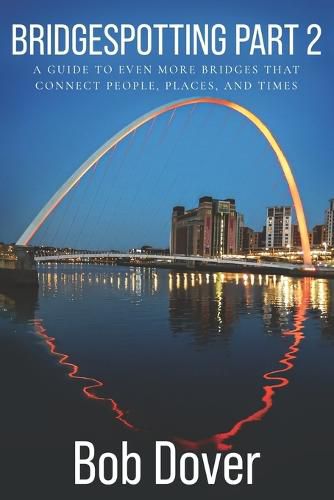Readings Newsletter
Become a Readings Member to make your shopping experience even easier.
Sign in or sign up for free!
You’re not far away from qualifying for FREE standard shipping within Australia
You’ve qualified for FREE standard shipping within Australia
The cart is loading…






Bridgespotting Part 2 is a companion guide to the original Bridgespotting: A Guide to Bridges that Connect People, Places, and Times, which examined dozens of reasons that tourists visit bridges in pursuit of best available view of the landscape or riverfront, to indulge an interest in the history of the city, to appreciate the architecture and decoration, to walk or bike on long-distance trails, or to cross a world-renowned landmark off their bucket list. Every bridge is a complete record of everything that has ever happened, and ever will happen, at its location. Although they are often dismissed as a static piece of infrastructure, or even hated for causing traffic jams, bridges actually encompass the entire history of the city from its original settlement and growth up to today, and often into the future.
Through their construction, demolitions, renovations, addition or removal of decorations and monuments, and changes of name, they capture decades or centuries of changes in local trade and commerce, interactions with faraway peoples, architectural tastes, political upheavals, and cultural history of a community.
Building on the description of more than 350 of the most prominent tourist bridges in the United States, Canada, and Europe in the original Bridgespotting, Bridgespotting Part 2 describes walkable bridges and bridge tours covering an additional 320 locations in more than 60 new profiles. Combined, the two Bridgespotting books serve as a travel guide for anyone interested in exploring the history and cultural development of their next vacation destination, taking a side trip during their next out-of-town business meeting, or getting a better understanding of their own community.
In addition, by describing the design decisions and features added to bridges by their designers to attract tourists and enhance the community, the Bridgespotting books serve as an a la carte menu of ideas to be considered by communities interested in constructing new bridges, or planning rehabilitation of their old, obsolete bridges.
$9.00 standard shipping within Australia
FREE standard shipping within Australia for orders over $100.00
Express & International shipping calculated at checkout
Bridgespotting Part 2 is a companion guide to the original Bridgespotting: A Guide to Bridges that Connect People, Places, and Times, which examined dozens of reasons that tourists visit bridges in pursuit of best available view of the landscape or riverfront, to indulge an interest in the history of the city, to appreciate the architecture and decoration, to walk or bike on long-distance trails, or to cross a world-renowned landmark off their bucket list. Every bridge is a complete record of everything that has ever happened, and ever will happen, at its location. Although they are often dismissed as a static piece of infrastructure, or even hated for causing traffic jams, bridges actually encompass the entire history of the city from its original settlement and growth up to today, and often into the future.
Through their construction, demolitions, renovations, addition or removal of decorations and monuments, and changes of name, they capture decades or centuries of changes in local trade and commerce, interactions with faraway peoples, architectural tastes, political upheavals, and cultural history of a community.
Building on the description of more than 350 of the most prominent tourist bridges in the United States, Canada, and Europe in the original Bridgespotting, Bridgespotting Part 2 describes walkable bridges and bridge tours covering an additional 320 locations in more than 60 new profiles. Combined, the two Bridgespotting books serve as a travel guide for anyone interested in exploring the history and cultural development of their next vacation destination, taking a side trip during their next out-of-town business meeting, or getting a better understanding of their own community.
In addition, by describing the design decisions and features added to bridges by their designers to attract tourists and enhance the community, the Bridgespotting books serve as an a la carte menu of ideas to be considered by communities interested in constructing new bridges, or planning rehabilitation of their old, obsolete bridges.